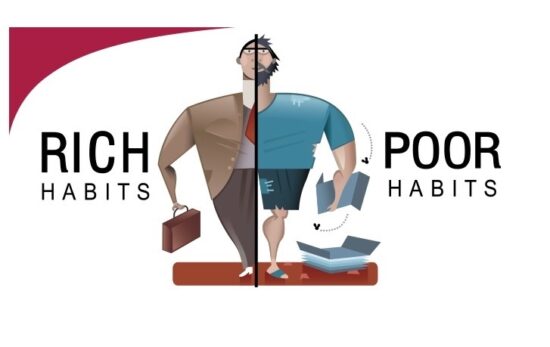
If you find value in these articles, please share them with your inner circle and encourage them to Sign Up for my Rich Habits Daily Tips/Articles. No one succeeds on their own. Thank You!
Those who know how to manage money make it their slave. Those who do not, become its slave.
In my research I discovered specific money habits of the rich that they used to accumulate enormous wealth:
- Put Money to Work – Accumulating money is good but it will not make you rich. You must put money to work if you want to become wealthy. And putting money to work means taking smart, calculated risks with that money. The rich put their money to work by investing it in stocks, bonds, real estate and businesses.
- Borrow Money to Create Assets – There is good debt and there is bad debt. Bad debt is debt you use to sustain your lifestyle. Good debt is debt you use to build assets that generate cash flow down the road.
- Save Money – Saving 10% or more of your earnings/income allows you to accumulate money. You want to accumulate money so that you can take advantage of investment opportunities that come along.
- Track What You Spend – Do you know where your money goes? You should. Tracking what you spend empowers you. It opens your eyes so you may know exactly where your money goes. Tracking your spending allows you to make adjustments to how you spend your money. If you don’t track your money it will disappear and once it’s gone you can’t get it back.
- Avoid Spontaneous or Emotional Purchases – Never buy anything on impulse. It is almost always the wrong thing to do. That spontaneous or emotional purchase will lose its luster after only a few weeks. Then you’re stuck with something you don’t need and that does not generate any income.
If you want to become rich you must become the master of your money. If you don’t it will fly away and land in someone else’s pockets, never to return again.

Tom Corley is an accountant, financial planner, public speaker, and author of the books “Effort-Less Wealth: Smart Money Habits At Every Stage of Your Life” and “RichKids: How to Raise Our Children to Be Happy and Successful in Life“. Corley’s work has appeared on CNN, USA Today, The Huffington Post, SUCCESS Magazine, and many other media outlets and podcasts in the U.S. and 27 other countries. Tom is a frequent contributor to Business Insider and CNBC.






Comments